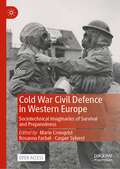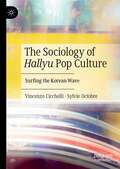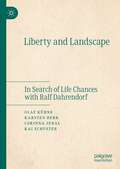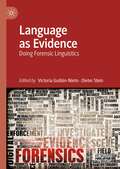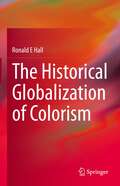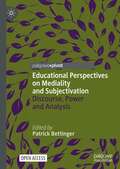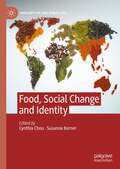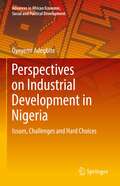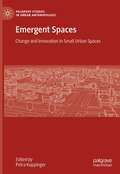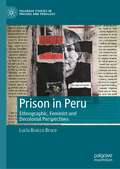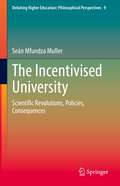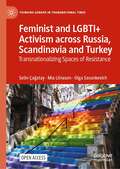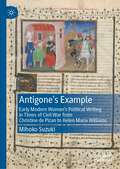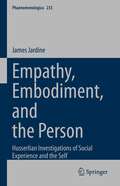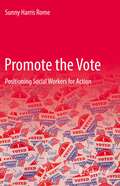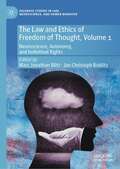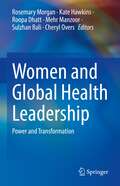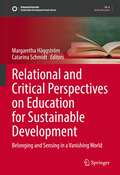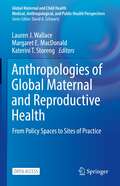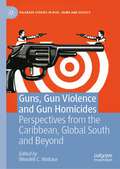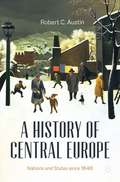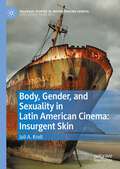- Table View
- List View
Prisons, Politics and Practices in England and Wales 1945–2020: The Operational Management Issues
by David J. CornwellThis book presents both a survey of and commentary upon the penal process of England and Wales between 1945 and 2020 from the primary perspective of prisons and their operational management. Part I focusses on the extent to which governmental polities, changing concepts in penology and significant events affected the performance and management of prisons during four key periods: 1945-1991; 1991-1997; 1997-2007 and 2007-2020. Part II presents a vision for more effective operation of prisons within the wider penal process in the 2020s and beyond. It draws upon the author's academic insights and his experience as a former prison governor. This book speaks to those in the social sciences, law and politics and to professionals in government and in the penal system who are interested in reform.
Cold War Civil Defence in Western Europe: Sociotechnical Imaginaries of Survival and Preparedness
by Casper Sylvest Marie Cronqvist Rosanna FarbølThis open access edited collection brings together established and new perspectives on Cold War civil defence in Western Europe within a common analytical framework that also facilitates comparative and transnational dimensions. The current interest in creating disaster-resilient societies demands new histories of civil defence. Historical contextualization is essential in order to understand what is at stake in preparing, devising, and implementing forms of preparedness, protection, and security that are specifically targeted at societies and citizens. Applying the concept of sociotechnical imaginaries to civil defence history, the chapters of this volume cover a range of new themes, from technology and materiality to media, memory, and everyday experience. The book underlines the social embeddedness of civil defence by detailing how it both prompted new forms of social interaction and reflected norms and visions of the ‘good society’ in an age where nuclear technology seemed to hold the key to both doom and salvation.
The Sociology of Hallyu Pop Culture: Surfing the Korean Wave
by Vincenzo Cicchelli Sylvie OctobreCombining global, media, and cultural studies, this book analyzes the success of Hallyu, or the "Korean Wave” in the West, both at a macro and micro level, as an alternative pop culture globalization. This research investigates the capitalist ecosystem (formed by producers, institutions and the state), the soft power of Hallyu, and the reception among young people, using France as a case study, and placing it within the broader framework of the 'consumption of difference.' Seen by French fans as a challenge to Western pop culture, Hallyu constitutes a material of choice for understanding the cosmopolitan apprenticeships linked to the consumption of cultural goods, and the use of these resources to build youth’s biographical trajectories. The book will be relevant to researchers, as well as undergraduate and postgraduate students in sociology, cultural studies, global studies, consumption and youth studies.
The Byzantine City from Heraclius to the Fourth Crusade, 610–1204: Urban Life after Antiquity (New Approaches to Byzantine History and Culture)
by Luca ZavagnoThis book explores the Byzantine city and the changes it went through from 610 to 1204. Throughout this period, cities were always the centers of political and social life for both secular and religious authorities, and, furthermore, the focus of the economic interests of local landowning elites. This book therefore examines the regional and subregional trajectories in the urban function, landscape, structure and fabric of Byzantium’s cities, synthesizing the most cutting-edge archaeological excavations, the results of analyses of material culture (including ceramics, coins, and seals) and a reassessment of the documentary and hagiographical sources. The transformation the Byzantine urban landscape underwent from the seventh to thirteenth centuries can afford us a better grasp of changes to the Byzantine central and provincial administrative apparatus; their fiscal machinery, military institutions, socio-economic structures and religious organization. This book will be of interest to students and researchers of the history, archaeology and architecture of Byzantium.
Liberty and Landscape: In Search of Life Chances with Ralf Dahrendorf
by Olaf Kühne Karsten Berr Corinna Jenal Kai SchusterThis book explores the importance of freedom and liberalism in the context of socialities, individualities and materialities. The authors provide a highly unusual and innovative blending of concepts about space and landscape through a deeply theoretical exploration of liberalism.Liberalism is often problematized in contemporary discussions with regard to gentrification, environmental problems and inequality. In contrast, this book refers to a liberalism that maximizes life chances in the context of dealing with spaces. A connection between freedom and space, based on liberal ideas, provides a much needed theoretical intervention in the fields of social and spatial sciences.
Language as Evidence: Doing Forensic Linguistics
by Dieter Stein Victoria Guillén-NietoThis edited book provides a comprehensive survey of the modern state of the art in forensic linguistics. Part I of the book focuses on the role of the linguist as an expert witness in common law and civil law jurisdictions, the relation of expert witnesses and lawyers, ethics standards, and courtroom interaction. Part II deals with some of the major areas of expertise of forensic linguistics as the scientific study of language as evidence, namely authorship identification, speaker identification, text authentication, deception and lie detection, plagiarism detection, and cyber language crimes. This book is intended to be used as a reference for academics, students and practitioners of Linguistics, Forensic Linguistics, Law, Criminology, and Forensic Psychology, among other disciplines.
The Historical Globalization of Colorism
by Ronald E HallThis topical book shows that racism by skin color is much more embedded and prevalent in the modern world than racism by race. In the aftermath of globalization, humanity has experienced unprecedented levels of interaction. This book presents evidence to show that in the 21st century which is dependent on ever-expanding communication technologies, and new forms of visual media actually exacerbate historical mores of colorism in the lives of humanity, i.e.: African, Asian, Latinx, Native and European descent. The book discusses the historical roots and current values of idealization of light skin, skin bleaching practices, stereotypes of skin color developed through migration and cultural assimilation, and health and educational consequences of colorism.
Educational Perspectives on Mediality and Subjectivation: Discourse, Power and Analysis (Palgrave Studies in Educational Media)
by Patrick BettingerThis open access book examines the complex relationship between education, media and power. Exploring the entanglement of education media and power structures, the contributions use various examples and case studies to demonstrate how subjectivation processes and digital structures interact with one another. The book asks which modes of subjectivation can be identified with current media cultures, how subjects deal with the challenges and potential of digitality, and how coping and empowerment strategies are developed. By addressing theoretical as well as empirical evidence, the chapters illuminate these connections and the subsequent significance for media education more widely.
Emotions and the Making of Psychiatric Reform in Britain, c. 1770-1820 (Palgrave Studies in the History of Emotions)
by Mark NeuendorfThis book explores the ways which people navigated the emotions provoked by the mad in Britain across the long eighteenth century. Building upon recent advances in the historical study of emotions, it plots the evolution of attitudes towards insanity, and considers how shifting emotional norms influenced the development of a ‘humanitarian’ temperament, which drove the earliest movements for psychiatric reform in England and Scotland. Reacting to a ‘culture of sensibility’, which encouraged tears at the sight of tender suffering, early asylum reformers chose instead to express their humanity through unflinching resolve, charging into madhouses to contemplate scenes of misery usually hidden from public view, and confronting the authorities that enabled neglect to flourish. This intervention required careful emotional management, which is documented comprehensively here for the first time. Drawing upon a wide array of medical and literary sources, this book provides invaluable insights into pre-modern attitudes towards insanity.
Food, Social Change and Identity (Consumption and Public Life)
by Cynthia Chou Susanne KernerUnlike food publications that have been more organized along regional or disciplinary lines, this edited volume is distinctive in that it brings together anthropologists, archaeologists, area study specialists, linguists and food policy administrators to explore the following questions: What kinds of changes in food and foodways are happening? What triggers change and how are the changes impacting identity politics? In terms of scope and organization, this book offers a vast historical extent ranging from the 5th mill BCE to the present day. In addition, it presents case studies from across the world, including Asia, the Pacific, the Middle East, Europe and America. Finally, this collection of essays presents diverse perspectives and differing methodologies. It is an accessible introduction to the study of food, social change and identity.
Perspectives on Industrial Development in Nigeria: Issues, Challenges and Hard Choices (Advances in African Economic, Social and Political Development)
by Oyeyemi AdegbiteThis book constitutes a critical review of Nigeria’s attempts to achieve rapid industrial development since independence from Britain in 1960. It details the issues, challenges, and hard choices confronted by Nigerian political leadership and highlights the reasons why the country ultimately failed to achieve industrial take-off in spite of its abundant human and material resources. Chapters take a retrospective look at government industrial development policies and programs, including the steel industry, agro-allied and forest-based industries, and the industrial estate development program. The book also discusses tariff and trade policies, incentives and disincentives to foreign direct investment (FDI) in the manufacturing sector, and small and medium enterprise (SME) development. The book concludes with a look at the recent drive towards regional integration as well as the potential impact of the Economic Partnership Agreement (EPA) between the European Union and sixteen countries of West Africa. Providing an exhaustive history of Nigeria’s economic and industrial development, this volume will be of interest to researchers and students of African economics, development studies, and industrial organization, as well as policy makers in both the public and private sectors.
Emergent Spaces: Change and Innovation in Small Urban Spaces (Palgrave Studies in Urban Anthropology)
by Petra KuppingerThis book explores different emergent spaces where diverse urbanites spontaneously negotiate, make and remake urban spaces, create opportunities, produce social change, challenge urban life, culture, and politics, or simply ask for their right to the city. The focus of this book is on spaces and contexts where change is seeded, regardless of whether it was planned and whether it was or will be successful in the end. Contributors analyze the seeds of change at their very inception in diverse cultural contexts across four continents. How do small groups of ordinary and often also disenfranchised people design, suggest and implement ideas of change? How do they use and remake small urban spaces to better suit their purposes, voice claims to the city, create opportunities, and design better urban lives and futures? The emphasis of this volume is not on the nature of activities and change, but on the minute processes of initiating change.
Prison in Peru: Ethnographic, Feminist and Decolonial Perspectives (Palgrave Studies in Prisons and Penology)
by Lucia Bracco BruceThis book expands the field of prison research by drawing on six months of unique, ethnographic research in Santa Monica prison, the largest women’s prison in Lima, Peru. Using feminist and decolonial perspectives, it explores power and the governance system and its implications on how the prison operates and the lived experiences of women prisoners and their interpersonal relationships. It reflects on the intersection of prison, imprisonment and gender from a Global South perspective and includes methodological reflections on how to research prisons in the Global South holistically. It fills a gap and engages with debates on governmentality and women’s agency within the penal context.
The Incentivised University: Scientific Revolutions, Policies, Consequences (Debating Higher Education: Philosophical Perspectives #9)
by Seán Mfundza MullerThe core thesis of this book is that to understand the implications of incentive structures in modern higher education, we require a deeper understanding of associated issues in the philosophy of science. Significant public and philanthropic resources are directed towards various forms of research in the hope of addressing key societal problems. That view, and the associated allocation of resources, relies on the assumption that academic research will tend towards finding truth – or at least selecting the best approximations of it. The present book builds on, and extends, contributions in philosophy and higher education to argue that this assumption is misplaced: with serious implications for modern higher education and its role in informing societal decisions and government policy. The book develops a philosophical foundation for the analysis of the connection between higher education incentives, scientific progress and societal outcomes. That in turn is used to demonstrate how the current approach to incentivising intellectual and scientific progress is likely not only to fail, but in fact to cause harm on the very dimensions it purports to improve. The arguments presented are illustrated with examples from medicine and academic economics, making the book one of the first to examine issues of scientific progress and social consequences across the human and social sciences. In doing so, it develops a novel critique of modern economics that in turn provides a more philosophically substantive foundation for popular critiques of economics than has existed to date.
Feminist and LGBTI+ Activism across Russia, Scandinavia and Turkey: Transnationalizing Spaces of Resistance (Thinking Gender in Transnational Times)
by Mia Liinason Olga Sasunkevich Selin ÇağatayWhat do struggles for women’s and LGBTI+ rights in Russia, Turkey and the Scandinavian countries have in common? And what can actors who struggle for rights and justice in these contexts learn from each other? Based on a multisited ethnography of feminist and LGBTI+ activisms across Russia, Turkey and the Scandinavian countries, this Open Access book explores transnational struggles on various levels, from the micro-scale of the everyday to large-scale, spectacular events. Drawing on ethnographic insights and encounters from various sites, this book conceptualizes resistance as situated in the grey zone between barely perceptible, even hidden or covert, forms of mundane activist practices and highly visible street protests, gathering large crowds. Taking the reader beyond the dichotomies of visible/invisible and public/private, this book advances new understandings of resistance, solidarity, and activism in transnationalizing feminist and queer struggles, illustrated by rich ethnographic case studies from Russia, Scandinavia and Turkey.
Antigone's Example: Early Modern Women's Political Writing in Times of Civil War from Christine de Pizan to Helen Maria Williams
by Mihoko SuzukiThis book investigates early modern women’s interventions in politics and the public sphere during times of civil war in England and France. Taking this transcultural and comparative perspective, and the period designation “early modern” expansively, Antigone’s Example identifies a canon of women’s civil-war writings; it elucidates their historical specificity as well as the transhistorical context of civil war, a context which, it argues, enabled women’s participation in political thought.
Empathy, Embodiment, and the Person: Husserlian Investigations of Social Experience and the Self (Phaenomenologica #233)
by James JardineThis text explores how self-consciousness and self-understanding differ phenomenologically from the experience and comprehension of others, and the extent to which such relations are constitutively interdependent.Jardine argues that Husserl’s analyses of selfhood and intersubjectivity are animated by the question of what's at stake in recognising an agent’s engagement as the situated response of a person, rather than simply as the comportment of an animal or living body. Drawing centrally from the freshly excavated Ideas II drafts and manuscripts, the author develops Husserl’s often fragmentary investigations of attention, habit, emotion, freedom, the common world, and action, and considers their implications for subjectivity and the experience of others. Empathy, Embodiment, and the Person also brings Husserlian phenomenology into dialogue with twenty-first century philosophical concerns, from accounts of selfhood and agency from analytic philosophy to the treatment of social experience in critical theory.The book shows the reader that transcendental phenomenology can be rejuvenated by engaging with a broader philosophical landscape and will appeal to researchers, students, and instructors in the field.
Promote the Vote: Positioning Social Workers for Action
by Sunny Harris RomeThis timely, relevant text is a comprehensive compendium of critical information about voting in the United States. It frames voting as an integral aspect of social work practice and provides concrete suggestions for how students can increase their involvement in expanding voter participation by marginalized groups.This book:Examines the current social and political context Introduces multiple perspectives on why voting mattersPresents a brief history of voting rights in the United StatesExplains the nuts and bolts of campaigns and electionsDiscusses who votes and who doesn’t, how people vote, and whyDescribes voter suppression tactics and identifies obstacles facing low-turnout groupsHighlights strategies to expand voter participationProvides concrete examples of how students can help maximize voter participationExplores how voter engagement intersects with social work at all levels of professional practiceThe only social work textbook devoted entirely to the topic of voting, Promote the Vote: Positioning Social Workers for Action is the ideal supplement for classes in social welfare policy, policy practice, human rights, and social justice. Filled with research findings, practical information, and case examples, this book provides social work students and professionals with the knowledge, strategies, and tools to engage clients and their communities in the electoral process. With voting rights quickly becoming a flashpoint in the struggle for equity and justice, now is the perfect time for this valuable resource.
The Law and Ethics of Freedom of Thought, Volume 1: Neuroscience, Autonomy, and Individual Rights (Palgrave Studies in Law, Neuroscience, and Human Behavior)
by Marc Jonathan Blitz Jan Christoph BublitzFreedom of thought is one of the great and venerable notions of Western thought, often celebrated in philosophical texts – and described as a crucial right in American, European, and International Law, and in that of other jurisdictions. What it means more precisely is, however, anything but clear; surprisingly little writing has been devoted to it. In the past, perhaps, there has been little need for such elaboration. As one Supreme Court Justice stressed, “[f]reedom to think is absolute of its own nature” because even “the most tyrannical government is powerless to control the inward workings of the mind.” But the rise of brain scanning, cognition enhancement, and other emerging technologies make this question a more pressing one. This volume provides an interdisciplinary exploration of how freedom of thought might function as an ethical principle and as a constitutional or human right. It draws on philosophy, legal analysis, history, and reflections on neuroscience and neurotechnology to explore what respect for freedom of thought (or an individual’s cognitive liberty or autonomy) requires.
Women and Global Health Leadership: Power and Transformation
by Rosemary Morgan Cheryl Overs Kate Hawkins Roopa Dhatt Mehr Manzoor Sulzhan BaliWomen represent the majority of people working to improve health outcomes in communities, non-governmental and multilateral organizations, both as paid and unpaid health and social care workers. So why is it that when it comes to leadership positions, we have a governance system that privileges men and what can we do to redress the imbalance? This ground-breaking collection explores the leadership roles that women hold in global health, teasing out the routes women have taken to leadership, the challenges they have faced, and what has facilitated their journey. It brings to the fore the stories of women on the frontlines of this struggle from around the world, highlighting and complementing these stories with theoretical and analytical explorations of the structures and systems that help or hinder the process. Among the topics explored: Gendered Institutions in Global Health Gender, Peace, and Health: Promoting Human Security with Women’s Leadership Academic Journal Publishing: A Pathway to Global Health Leadership Women in Health Systems Leadership: Demystifying the Labyrinth Women’s Leadership in Global Health: Evolution Will Not Bring Equality The book is a rallying call to arms to redress gender inequality and celebrate the many ways in which women are taking the lead in supporting the health of their communities internationally. Women and Global Health Leadership is a must-read for those working in or studying global health. It is also a primer that aims to support other women in their efforts and struggles to succeed in a highly unfair and unequal world. The book will engage ministers of health, policy-makers, practitioners, academicians, students, researchers, healthcare workers, health service managers, and members of multilateral organizations. By highlighting key barriers and facilitators to women in global health leadership, organizations can use this book to help inform the development of institutional policies and procedures to support women in leadership positions across academic, health workforce, and global health governance systems. It also can be used within postgraduate courses focusing on the global heath workforce, leadership and management, and women’s studies.
Relational and Critical Perspectives on Education for Sustainable Development: Belonging and Sensing in a Vanishing World (Sustainable Development Goals Series)
by Margaretha Häggström Catarina SchmidtThis volume focuses on the fourth Sustainable Development Goal (SDG), education, to look at sustainability from various angles with the purpose of challenging preconceptions about what sustainable education might entail and how it should be conducted. To this end, the book assembles scholars from various research fields and disciplines, who are willing to be at the cutting edge regarding sustainability and education on all levels with students in the ages of 6-15. Through this approach, the text points towards a “wild pedagogy” in line with post-sustainable thinking. This involves agency and the role of nature itself as a co-educator, and promotes cultural changes, and explorative processes of finding “the wild” – the unknown, and complexity in nature – and thus of challenging the human need for control. This approach is also, in line with the 2030 Agenda, an attempt to move from advocating predetermined behavioural change to embracing a pluralistic perspective on sustainability, based on holistic views on education. Such views include curiosity, wonderment, compassion and agency as guiding lights. The book is structured into three sections, based on three interrelated strands. These strands are, in various ways, dependent on one another and further engaged with bringing education theory and practice together. These strands are 1) Belonging and sensing, 2) Critical thinking, social justice and action competence, and 3) Creating hope in a vanishing world. These strands aim to increase our access to and understanding of the ways in which sustainability can be integrated into education and why. The purpose of the text is to encourage educators of all kinds and levels, as well as scholars in different fields, to explore new perspectives on education for sustainable development. The book examines probes in diverse academic fields and focuses on how to combine different approaches and content, and therefore everyone interested in interdisciplinary and cross-curricular teaching and learning should find this work enlightening.
Anthropologies of Global Maternal and Reproductive Health: From Policy Spaces to Sites of Practice (Global Maternal and Child Health)
by Lauren J. Wallace Margaret E. MacDonald Katerini T. StorengThis open access edited book brings together new research on the mechanisms by which maternal and reproductive health policies are formed and implemented in diverse locales around the world, from global policy spaces to sites of practice. The authors – both internationally respected anthropologists and new voices – demonstrate the value of ethnography and the utility of reproduction as a lens through which to generate rich insights into professionals’ and lay people’s intimate encounters with policy. Authors look closely at core policy debates in the history of global maternal health across six different continents, including: Women’s use of misoprostol for abortion in Burkina FasoThe place of traditional birth attendants in global maternal healthDonor-driven maternal health programs in TanzaniaEfforts to integrate qualitative evidence in WHO maternal and child health policy-making Anthropologies of Global Maternal and Reproductive Health will engage readers interested in critical conversations about global health policy today. The broad range of foci makes it a valuable resource for teaching in medical anthropology, anthropology of reproduction, and interdisciplinary global health programs. The book will also find readership amongst critical public health scholars, health policy and systems researchers, and global public health practitioners.
Guns, Gun Violence and Gun Homicides: Perspectives from the Caribbean, Global South and Beyond (Palgrave Studies in Risk, Crime and Society)
by Wendell C. WallaceThis book provides in-depth coverage of guns, gun violence and gun homicides from a variety of perspectives, including, but not limited to, gender, suicide, peaceology and police (in)action. Reflecting changes in contemporary perceptions as well as desires for scholarship emanating from under-researched areas of the globe, this book addresses the pervasive issue of guns, gun violence and gun homicides. Authored by a wide range of Social Science experts, and premised on the notions of epistemological diversity, inclusivity and knowledge production in the Global South, this book provides comprehensive coverage on the nebulous concern of guns and their destructive force using differing approaches to the same problem, with a focus on prevention/reduction of gun violence. Readers may find the chapters contained in this book to be fascinating, provocative, informative, clearly presented and solution oriented. This book is of special interest to students, criminologists, policymakers, criminal justice system officials and laypersons. It is invaluable to policymakers at differing levels of government who provide advice on the social issue of guns and gun violence in their respective jurisdictions.
A History of Central Europe: Nations and States Since 1848
by Robert C. AustinThis textbook offers a survey of the history of Central Europe since 1848, from the ‘Springtime of Nations’, through the world wars and communist period, to NATO and EU membership. With an emphasis on nation-building, it gives the reader a better understanding of not just political history but also of the region’s economic development and of everyday life. The book brings the reader right up to the present, considering contemporary issues such as the impact of the 2015 refugee crisis, migration out of Central Europe, the weakening of democratic institutions and the re-emergence of nationalism. Throughout, it offers fresh perspectives, gives agency to Central Europe, and pays attention to the ethnic, linguistic and religious diversity of the region. This is essential reading for students taking courses on Central/East-Central Europe. It is also suitable for courses on 19th and 20th Century Europe, or for anyone with an interest in the region.
Body, Gender, and Sexuality in Latin American Cinema: Insurgent Skin (Palgrave Studies in (Re)Presenting Gender)
by Juli A. KrollInsurgent Skin: Body, Gender, and Sexuality in Latin American Cinema argues that twenty-first century Latin American cinema about lesbian, feminist, intersex, and transgender themes is revolutionary because it disrupts heteronormative and binary representation and explores new, queer signifying modes.Grounded in feminist and queer theory, Insurgent Skin conjugates film phenomenology and theories of affect and embodiment to analyze a spectrum of Latin American films.The first chapters explore queer signifying in Argentinean director Lucrecia Martel’s Salta trilogy and the lesbian utopia of Albertina Carri’s Las hijas del fuego (2018). Next, the book discusses the female body as uncanny absence in Tatiana Huezo’s documentary Tempestad (2016), a film about gendered violence in Mexico. Chapter Five focuses on intersex films and the establishing of queer solidarity and an intersex gaze. The last chapter examines transgender embodiment in the Chilean film Una mujer fantástica (2017) and Brazilian documentary Bixa Travesty (2018).

